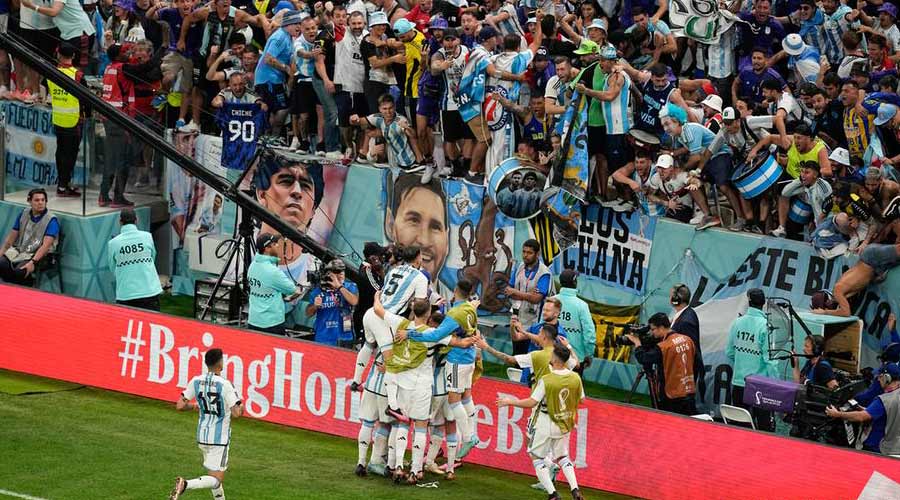Argentina almost did it the easy way. For a while, Lionel Messi and his teammates were coasting. They had a two-goal lead against the Netherlands, and just a few minutes to see out.
They were comfortable. And then, all of a sudden, they were not.
They got there in the end, of course, but it would not be Argentina if there was not a little suffering. It had all seemed like such smooth sailing.
Argentina had won a victory of sorts even as their battalions of fans, decked out in sky blue and white, were still filling the steep, banked stands of the Lusail Stadium: a few miles away, Brazil had been eliminated by Croatia, Argentina’s fiercest rival and the most intimidating obstacle on their route to the final vanquished in one fell swoop.
Barely a couple of hours later, the second victory seemed secure.
Messi had created Argentina’s first goal, threading a pass of delicate brilliance into the path of Nahuel Molina, and scored their second, converting a penalty after Marcos Acuña had been tripped by Denzel Dumfries.
As Messi stood in front of Argentina’s fans, his arms outstretched in front of him, as if waiting for their gratitude for the gift he had bestowed upon them, many in the crowd would have allowed their thoughts to wander to next week, to the meeting with Croatia, or even a little further still, to what they have come to refer to as “la tercera”, the country’s third World Cup.
The prospect felt, in that moment, less of a fever dream than ever. Argentina’s campaign in Qatar had started with one of the most searing humiliations in the country’s sporting history: beaten, here at Lusail, by a Saudi Arabia team that had barely been granted a second thought in the weeks leading to the tournament.
That loss, with its echoes of Argentina’s defeat to Cameroon in 1990, shredded the team’s delicate confidence. The nation indulged in a bout of soul-searching and teeth-gnashing.
The players held tense, emotionally charged meetings.
Lionel Scaloni, the coach, took a team that had not lost a game for almost three years and ripped it up to start again from scratch.
These are not, as a rule, reliable indicators of forthcoming success. And yet, since then, Argentina have painstakingly played their way back to equilibrium.
Each game has been a little less fraught than the last; the emotionality — that sense that everything was now or never, that the pressure of delivering Messi the World Cup that he craves was overwhelming — has ebbed away.
Against Mexico, Argentina were full of angst until the 86th minute. Against Poland, they had settled things after only a little more than an hour.
They cruised against Australia until a late, fortuitous goal forced Scaloni’s men to grit their teeth and hold their nerve.
The Netherlands, in theory, presented a far more exacting challenge; the reality, in those first 75 minutes or so, was quite the opposite.
It was not easy, not at all, but it was smooth. Not for long. Louis van Gaal, the Dutch coach, has spent much of the last year or so locked in a philosophical battle with elements of his homeland’s news media.
They would prefer him to play a more traditional Dutch style: fluid, adventurous, aesthetically pleasing. He is adamant that the modern game is about absorbing pressure, setting traps, seeking a sucker punch.
On Friday, he chose option C: throwing on two enormous strikers and firing balls at their heads until something happened.
With seven minutes to play, one of them, Wout Weghorst slipped his marker and diverted Steven Berghuis’s cross past goalkeeper Emiliano Martínez, halving the deficit.
Argentina clenched their fists and tried to hold on.
They survived until almost 11 minutes of injury time had elapsed, the final few seconds of a distended period of added time, when they were caught out by the ingenuity — and courage — of the Dutch midfielder Teun Koopmeiners, who chose the last minute of a World Cup quarter-final to produce the sort of imaginative brilliance that Messi would be proud to call his own.
Presented with a free kick only a few inches outside the Argentine penalty area, Koopmeiners, rather than shoot, slipped a low pass into Weghorst’s feet.
The striker swiveled and shot in one fluid motion.
Argentina’s players slumped to the floor, their certainty shredded, the score tied. They were going to have to do this the hard way.
The hardest, in fact.
Extra time came and went, the mood of the game descending from fractious into downright furious.
Leandro Paredes sparked a mass confrontation with the Dutch substitutes and was fortunate not to be sent off.
The players scrapped and clawed at each other.
What chances there were fell to Argentina. Enzo Fernández shot wide. Lautaro Martínez hit the post. Fortune did not seem to be smiling on them. Penalties loomed.
Once again, it all seemed to be going so well.
Emiliano Martínez, Argentina’s goalkeeper, is a specialist on these sorts of occasions. He saved the first two Dutch efforts.
In the stands, the fans roared, their fear converted into a vaguely primal sound. But that would have been the easy way, and Argentina do not take the easy way. Enzo Fernández missed.
Suddenly, the Argentines could feel the breath of the Dutch on their necks.
Emiliano Martínez could not find another save. And so it came down to Lautaro Martínez, the forward dropped after two games because of his erratic finishing.
He stepped up, and he scored.
The stadium shook with the noise.
A few minutes later, Argentina’s players were standing in almost exactly the same spot as Messi had an hour or so earlier.
They had their arms slung around each other’s shoulders as they bounced on their heels in celebration.
Messi has enjoyed those moments of communion with the public during this tournament, conducting the choir, singing along. This time, though, he slipped quietly away.
As he made his way towards the tunnel, he looked up at the heavens, as if in prayer, thankful that Argentina had made it through their ordeal, relieved to have got there, even if it had taken the long way around.
New York Times News Service












